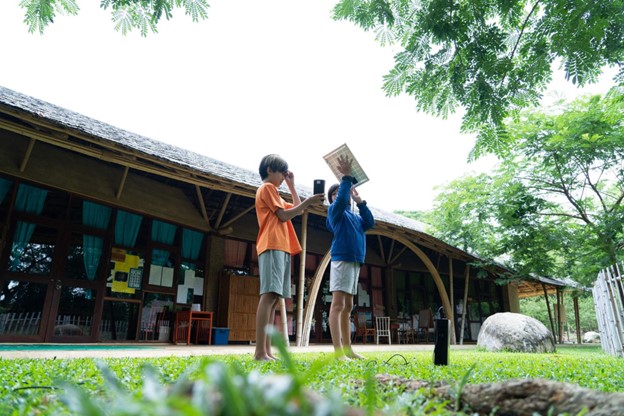At the centre of any sustainable school culture is a clear vision and mission that values environmental stewardship. Schools must embrace a vision that integrates ecological principles into all aspects of their education and school ecosystem. This vision should go beyond the superficial, aiming to instil in students a deep understanding of the interconnectedness between human actions and the environment.
Panyaden International School in Chang Mai, Thailand has sustainability at its heart, from the rainwater collection system to the bamboo buildings designed to have a low carbon footprint. Sustainable schools set ambitious goals to become carbon-neutral or even carbon-negative. They establish greenhouse gas reduction targets, implement energy-efficient practices, and explore renewable energy options. Additionally, they promote sustainable transportation by encouraging students to walk, cycle, or carpool to school.
By involving students in these initiatives, the IPC and Climate Action Schools empower them to be part of the solution and foster a sense of environmental responsibility. Panyaden’s initiatives include a vast recycling program, a rainwater collection system, a rice-field lifecycle system and eco-friendly buildings. From an operational perspective, by implementing effective waste reduction systems and prioritizing recycling and composting schools can significantly reduce the amount of waste sent to landfills. This not only benefits the environment but also sets an example for students to follow in their personal lives. Students at Panyaden are involved in composting and gardening, meatless meal days and food waste reduction programs.
Growing and greening a sustainable school culture is a multifaceted endeavour that involves embracing a mission of environmental stewardship, aligning financial and policy decisions with ecological principles, and actively participating in the sustainable development goals as well as in climate action education such as in the Climate Action Schools program. Sustainability is at the forefront of Panyaden’s organisation, but also their educational vision.
“By offering a Genuine Values-based Education for a Sustainable Planet, our vision is to see that our children excel academically, enrich their physical, social, emotional and intellectual well-being and develop a caring and compassionate understanding of the environment, to benefit themselves, the people they meet and the planet.” (https://www.panyaden.ac.th/academic-programme)
As a new partner of the ICA, the emergence of the Climate Action Schools (CAS) program (by Take Action Global) has become a significant driving force in growing and greening sustainable school cultures. In 2022 CAS completed their first school year with 100 member schools in their first cohort chosen from around the world. The outcomes have been hugely impactful for the students, teachers and school community. The program is led by a designated and trained school Climate Champion and provides professional development certification to train all teachers in learning about climate action education. Climate Action Schools encourage community engagement and collaboration. Schools forge partnerships with local organizations, governments, and businesses to create a network of support for sustainability initiatives. This community involvement allows schools to access additional resources and expertise, amplifying the impact of their efforts.
In October 2022, Panyaden began its journey with Climate Action Schools. Through the CAS audit, the primary students identified that bamboo is their signature species and IMYC students began composting projects. Becoming part of the CAS community helped to provide some focus and guidance to teachers and students regarding sustainability. In the primary, the CAS initiative was highlighted and presented in several staff meetings. The CAS framework allowed the community to recognize the strengths and areas for growth providing a common goal including a focus for learning.
Students also learn to understand their environment through field trips, service-learning projects, and being part of the community. In addition to curriculum integration, schools can establish environmental clubs or student-led initiatives that engage students directly in sustainability efforts. These groups can organize tree planting drives, waste reduction campaigns, or even establish school gardens to promote the connection between food and the environment. Such activities foster a sense of ownership and responsibility, empowering students to actively contribute to a greener school environment. Examples include:
Service Learning and Climate Action School projects
Composting
Planting trees and gardening
Repurposing clothing
Animal welfare
IPC/IMYC Field trips/projects
Year 1 Organic farm and composting
Year 4 visit to hydroelectric plant, sustainable bamboo city design
Year 5 Making brooms from recycled bottles
Year 6 visit to solar energy centre, solar panel, and rainwater pond cleaning
Year 7 organic farm and composting
Year 10 animal welfare and habitat restoration
By integrating sustainability into the curriculum, empowering students to take action, and pursuing environmentally friendly practices, schools can play a vital role in nurturing a sustainable future. Through these collective efforts, we can foster a generation of environmentally conscious individuals who will, as Panyaden International School’s vision exemplifies, “develop a caring and compassionate understanding of the environment that will benefit themselves, the people they meet and the planet.”
International Primary Curriculum



.png)